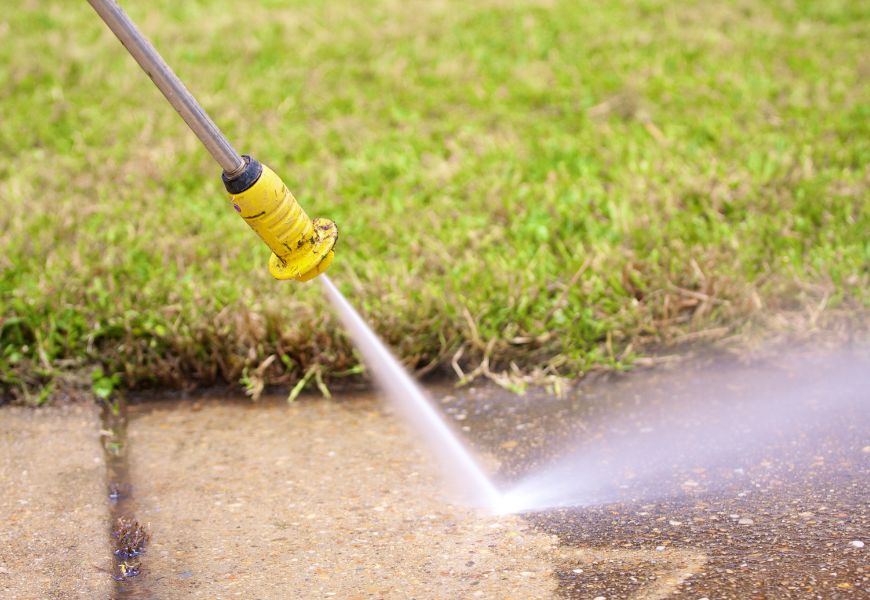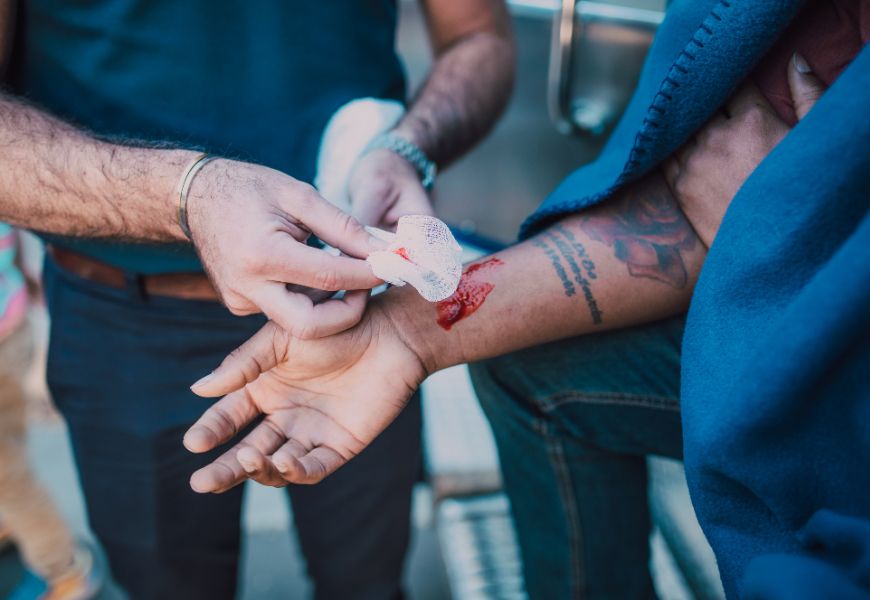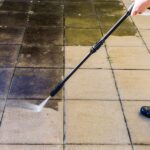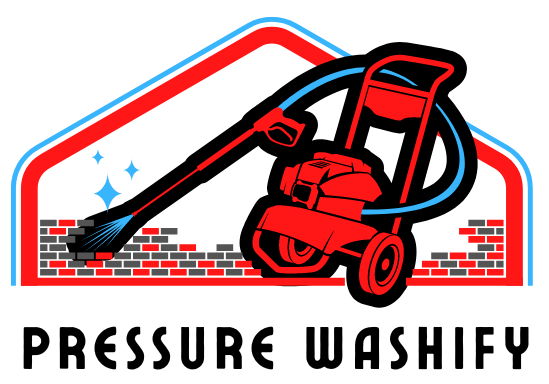Affiliate Disclaimer: This post may contain affiliate links, meaning we get a commission if you decide to make a purchase through our links, at no extra cost to you.
Pressure washers are a popular tool for both homeowners and pros because they can clean a wide range of surfaces quickly and well. But like any other tool with a lot of power, using a pressure washer can also be dangerous.
Can a pressure washer cut you?” The short answer is Yes, Spray from a pressure washer can cut through skin if the pressure is more than 1500 psi.

Understanding Pressure Washers
Pressure Washers: How They Work
A pressure washer or a power washer has an electric motor or a gas engine that powers a high-pressure water pump. The pump pressurizes the water from a connected source, like a garden hose, through a small nozzle at the end of a wand. This makes a powerful jet of water which is deadly when concentrated.
Power Levels and Types of Pressure Washers
There are different kinds of pressure washers, and each has a different amount of power, which is usually measured in pounds per square inch (PSI) and gallons per minute (GPM). Gas-powered pressure washers usually have higher pressure ratings than electric pressure washers.
Did You Know?
Most residential pressure washers range from 1,000 to 3,000 PSI, while commercial and industrial models can hit 7,000 PSI or more.
Can a Pressure Washer Cut You?
How Much PSI Can Cut You?
The PSI of a pressure washer determines its ability to cut or lacerate a person. This depends on the type of nozzle, the distance of the spray, and the sensitivity of the person’s skin.
Most people agree that pressure washers with a PSI of 1,500 or higher can cause serious skin penetration and cuts. This is if the water stream touches the skin directly.
It’s important to remember that even smaller PSI levels can hurt you if you don’t use them right or don’t have the right gear.
Pressure Washers Are Not Toys
Using a pressure washer without taking the right measures can cause many different kinds of injuries. Some of the most common injuries are bumps, cuts, pokes, and injuries to the eye.
In the worst cases, people may have serious tissue damage, bone fractures, or even have a limb amputated. Also, the strong water stream can send debris flying into the air, which can cause cuts, scrapes, and eye injuries.
Factors Contributing to the Risk of Cuts
Using a pressure washer puts you at risk of cuts and scrapes for a number of reasons. These things are:
- Pressure Level: As we’ve already said, pressure washers have different levels of power, with higher PSI levels offering a greater risk of injury. If you use a pressure washer with a higher PSI than you need for the job, you might get cut or hurt in other ways.
- Type of Nozzle: Pressure washers usually come with different nozzle extensions that let you change the angle and strength of the water stream. A narrower angle when using a tip creates a more concentrated and powerful spray. This increases the likelihood of the spray cutting your skin if it makes contact.
- Distance from the Spray: The higher the risk of damage, the closer someone is to the high-pressure water stream. Keeping a safe distance from the spray can help make cuts and other accidents less likely.
Statistics on Injuries Caused by Pressure Washers
The U.S. Consumer Product Safety Commission (CPSC) says that every year, thousands of people go to the emergency room because of accidents caused by pressure washers. In 2014 alone 6057 people went to emergency rooms with pressure washer related injuries.
Most of these injuries are caused by the highly pressurized water jet, which can cause cuts, punctures, and other kinds of damage.
Pressure Washing Safety Tips
When using a pressure washer, it’s important to follow safety rules so you don’t hurt yourself, especially by cutting or slicing yourself. You must never leave your pressure washer unattended.
Here are some tips to help you clean in a safe and effective way:
Read & Follow The Manual
You should read the user instructions carefully to operate a pressure washer safely. Learn about its features, how to use it correctly, and safety rules. If you do what the maker tells you to do, you’re much less likely to hurt yourself.
Put on Proper Safety Gear
First safety precaution to take is to wear the right safety gear. This includes things like gloves, masks, and shoes. Always wear closed-toe shoes to protect your feet and safety goggles to protect your eyes.
Wearing gloves is necessary to protect your hands from getting cut by high-pressure jet of water. Good quality gloves protect your hands from hot water, detergents, and other chemicals.
Wells Lamont Heavy Duty PVC Coated Work Gloves

- Waterproof
- Abrasion & Cut Resistant
- Chemical Resistant
- Comfortable Cotton Lining
Also, wear long pants and a long-sleeved shirt to protect your skin from the high-pressure water stream and any debris that might get into the air.
Find out the best waterproof safety boots for pressure washing here.
Stay away from the spray
Keep a safe distance from the high-pressure water stream, both for yourself and for other people. The spray is more likely to hurt you if you are close to it. When cleaning around windows, doors, and other places where people might be, be extra careful.
How to Choose and Use the Right Nozzle
Choose the right nozzle for the job by thinking about both the pressure and the angle of the spray. Using a nozzle with a bigger spray angle will lessen the force of the water stream, making cuts and other injuries less likely.
If you don’t have to, don’t use a tip with a narrow-angle or a high-pressure setting.
Regular Maintenance and Inspection
Check your pressure washer often for signs of wear or damage, and do any upkeep that’s needed to keep it in good shape. This includes making sure that the hoses, links, and nozzles don’t have any problems that could make someone hurt.
Pressure Washer Injury: Identifying the Type
Different kinds of pressure washer injuries include:
- Cuts and open wounds: The high-pressure water stream causes cuts or tears in the skin.
- Puncture: These wounds happen when the high-pressure water goes through the skin and into the tissues underneath, making a small hole or point of entry.
- Eye Injuries: When high-pressure water or debris gets into the eyes. It can cause injuries ranging from mild irritation to serious damage to the eye structures. Wearing safety goggles is essential.
- Bruises and contusions: These injuries can come from the force of the water stream or from flying debris hitting the body and hurting the skin and organs underneath.
Determining the Severity of the Injury
Once you know what kind of damage it is, you need to figure out how bad it is. Here are some tips to help you figure out how bad the pain is:
- Minor Wounds: Most small cuts, scrapes, or bruises that don’t cause a lot of blood, pain, or trouble moving the injured area are considered minor injuries. Most of the time, you can treat these injuries with basic first aid, and they usually heal without any problems.
- Moderate Injuries: Moderate injuries may include cuts or punctures that are deeper or bigger or ones that cause a lot of pain and swelling. For these wounds to heal properly, you may need stitches or other medical care from a professional.
- Severe Injuries: Severe injuries include deep cuts or punctures that reveal the tissues underneath, serious eye injuries, or any injury that makes it hard to move the affected body part or causes a lot of pain. These injuries need urgent care and should be treated by a doctor and may need more treatment and time to heal.
How to Treat a Pressure Washer Wound
Knowing how to give first aid for injuries caused by a pressure washer can help reduce pain, stop infections, and speed up the healing process.
How to Give First Aid for Minor Wounds

If a pressure washer gave you a small cut, scrape, or bruise, do these things to take care of the wound:
- Taking care of the wound: Rinse the wound with clean, cool water to clear any dirt or debris. Don’t put soap, hydrogen peroxide, or alcohol on the cut directly, as these can irritate the skin and slow the healing process.
- Applying antibiotic ointment: After cleaning the wound, put a thin layer of antibiotic ointment (like Neosporin) on it to help avoid infection and speed up healing. If you can’t use antibiotic ointments because of an allergy, you can use petroleum jelly instead.
- Putting on a bandage: Put a sterile adhesive bandage or gauze pad over the cut to keep dirt and germs from getting in. Every day or whenever it gets wet or dirty, change the dressing.
Caution
Infections can lead to amputations if not treated properly.
How to Treat Eye Wounds
If you hurt your eye with a pressure washer, you need to take action right away to reduce the chance of long-term damage. Do these things:
- Putting clean water in the eye: As soon as possible, wash the eye for at least 15 minutes with clean, cool water. You can use a tap, a showerhead, or a clean container with a gentle stream of water. During the washing process, try to keep the hurt eye open as much as possible.
- Don’t rub your eyes or put pressure on them: Don’t rub or press on the hurt eye, because that could make it worse. Keep your hands away from your eyes and don’t touch them with anything, like cotton swabs or tissues.
- Looking for medical help: After cleaning the eye, it’s important to see a doctor to find out how bad the injury is and get the right treatment. Even if the pain or soreness seems to go away after rinsing, you should still see a doctor to make sure there isn’t any deeper damage.
When to Go to The Hospital?
Some pressure washer accidents can be fixed with basic first aid, but in other cases, you need to go to the doctor. It’s important to know the signs that you need medical help because getting help right away can avoid complications and help you get better faster.
Here are some times when you should go to the doctor:
Deep or Large Wounds
If the cut or laceration is deep, big, or shows beneath tissues like muscles, tendons, or bones, you need to see a doctor right away. A doctor or nurse will look at the wound, clean it well, and may use stitches or other ways to close it and help it heal properly.
It’s hard to move the affected area
If the injury makes it hard to move the part of your body that was hurt, it could mean that muscles, tendons, or nerves are also hurt. In these situations, it’s important to see a doctor for a full evaluation and the right treatment.
Signs of Infection
Any kind of damage, like cuts and scrapes from a pressure washer, can lead to an infection. If you see signs of an infection, like more redness, swelling, warmth, pus coming out, or a fever, you should see a doctor right away.
If you act quickly, you can help stop the infection from spreading and causing more problems.
Severe Pain or Swelling
If you have serious pain or swelling that doesn’t get better with basic first aid, you need to see a doctor right away. This could be a sign of a more serious injury or a deeper problem that needs more testing and care.
X-ray may be needed to check if there is any subcutaneous injury.
Eye Injuries that Cause Pain or Changes in Vision
If you hurt your eye with a pressure washer and even after flushing it with water, you still feel pain, see changes, or have other worrying signs, you should see a doctor right away.
Eye injuries can be very bad and may need specialized care to keep them from getting worse over time.
Last Words
Pressure washers are generally safe if handled properly. However, no matter how strong you think a pressure washer is, you should never forget that it can cause cuts and other injuries. Depending on the PSI level and other factors, the high-pressure water stream can easily hurt skin, muscle, and even bone.
So, when using a pressure washer, it’s important to put safety first by following the rules, wearing protection gear, and staying away from the water stream.
By knowing what could go wrong and taking the right measures, you can use a pressure washer to clean well while minimizing the chance of getting hurt.









